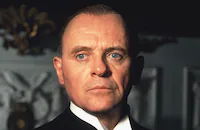“They don't care from heart, kid. They just want to be entertained.”
Ventriloquism in film can be traced back to the silent era, most notably with Lon Chaney’s turn as Professor Echo in Tod Browning’s The Unholy Three (1930). Though early depictions portrayed ventriloquism as a component of a larger vaudevillian sideshow act filled with comedy and slapstick, James Cruze’s 1929 film The Great Gabbo placed the ventriloquist dummy squarely into the realm of the macabre, blurring the line between reality and imagination and forming the horrific idea that a ventriloquist could lose control of their dummy at any time. By the mid-1930s, ventriloquism began to enter the mainstream with renowned ventriloquist Edgar Bergen (father of actress Candice Bergen). Bergen successfully fashioned one of the most popular radio shows of the time around an act featuring his dummy, Charlie McCarthy, and became one of the most famous ventriloquists of the 20th century.
By 1945, ventriloquism in film entered firm horror territory with the British anthology film Dead of Night, with one of the film’s stories (“The Ventriloquist’s Dummy”) centering on the relationship between a ventriloquist (Michael Redgrave) and the parasitic relationship he develops with his dummy Hugo. Dead of Night, along with appearances of devious dolls and dummies in episodes of The Twilight Zone, would further associate ventriloquism with the horror genre, influencing countless novels, television shows and films, from Buffy the Vampire Slayer to R.L. Stine’s young adult book series Goosebumps. Another film centrally influential in the ventriloquism as horror canon is Richard Attenborough’s Magic (1978), starring two-time Academy Award winner Anthony Hopkins and Ann-Margret.
Magic tells the story of failed professional magician Charles “Corky” Withers (Hopkins), who spends his nights trying to launch his amateur magic act unsuccessfully to disinterested audiences at New York clubs. Corky’s mentor Merlin (E.J. André), a once-great professional magician, encourages him to develop his talent despite his initial failure. Audiences aren’t receptive to Corky's amateur magic tricks, leaving him desperate for approval and on the verge of a mental breakdown. Corky’s luck changes when he incorporates a crass, wise-cracking ventriloquist dummy called Fats into his act. Fats is billed by Corky's manager Ben (Burgess Meredith) as the “first X-rated dummy on the block", serving as a foil to the mild-mannered ventriloquist. The duo delights clubgoers and eventually provides Corky with a modicum of success, securing him a slew of television appearances to show off his new novelty act.
Unable to cope with the looming success that television recognition could bring, Corky retreats to the Catskills and takes up residence in a small cabin, reuniting with his former flame Peg (Ann-Margret), who is now trapped in an unfulfilling marriage with Duke (Ed Lauter). As the relationship between Corky and Peg intensifies, the bond between Fats and Corky begins to deteriorate, along with Corky's grip on reality. Are the dummy’s actions real or imagined hallucinations of a ventriloquist gone mad? Though Magic was marketed as a horror film (featuring the tagline “A Terrifying Love Story”), the film can be seen more as a psychological drama when the action moves out of the city and focuses on the romance between Corky and Peg. The tender romance between the two underscores the pain felt by both characters amidst the presence of the two bad “men” in their lives – Fats and Duke.
Magic was the third collaboration between Anthony Hopkins and Richard Attenborough (the two had previously worked together on 1972’s Young Winston and A Bridge Too Far in 1977). Attenborough agreed to direct the film as part of a deal with Joseph E. Levine to secure financing for his film Gandhi in 1982. Levine had acquired the rights to William Goldman’s novel of the same name in 1976 for $1 million, with the stipulation that the author also write the screenplay. Gene Wilder was Attenborough’s first choice to play Corky, but the role ultimately went to Hopkins, who received both Golden Globe and BAFTA nominations for his performance.
Though John Carpenter’s Halloween overshadowed all horror films at the box office by the end of 1978, the film was still a relative success, ultimately grossing $23.8 million at the box office. Magic was also well received by critics, with Gene Siskel placing the film at number 9 on his list of Top 10 Films of 1978 (alongside Halloween and Ingmar Bergman’s Autumn Sonata).
Despite its modest success, Magic failed to spark a trend toward more nuanced depictions of the ventriloquist profession across all genres. This is perhaps due to the rise of killer doll films like Child’s Play (1988) and more recently Annabelle (2014) and its two sequels. Dolls are inherently free from the control of one individual, and their status as inanimate playthings creates a terror that isn’t as easily replicated when you can see how they are being manipulated. But as Magic proves, sometimes what you can see is more terrifying than the unknown under your bed.



















